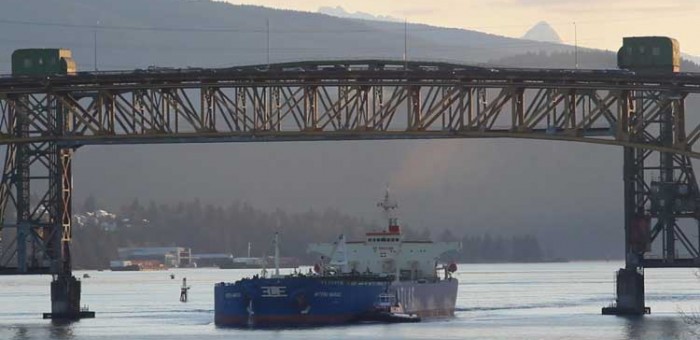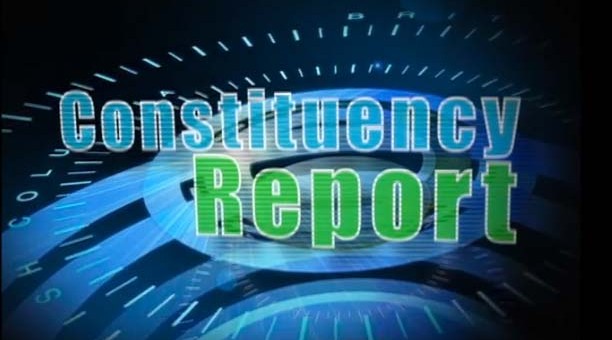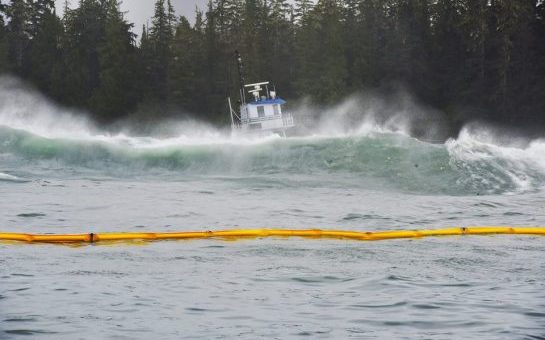Issues & Community Blog - Andrew Weaver: A Climate for Hope - Page 106
Responding to Ministerial Panel Report on Trans Mountain Pipeline
Media Release: November 3rd, 2016
Andrew Weaver responds to Ministerial Panel Report on Trans Mountain Pipeline
For Immediate Release
Victoria, B.C. – Andrew Weaver, Leader of the BC Green Party and MLA for Oak Bay-Gordon Head has issued the following statement in response to the publication of the Report from the Ministerial Panel for the Trans Mountain Expansion Project:
“I want to commend this panel for identifying and discussing a number of the gaps that existed in the NEB hearing process into the Trans Mountain Pipeline. As an intervenor in the process, my office was continually struck by the narrow and limited perspective that was used in assessing a project that has significant national and intergenerational ramifications.”
“I have heard from thousands of students during my time as a professor at the University of Victoria, and there is a real sentiment of disillusionment and hopelessness that threatens to take hold if governments don’t start acting in the interests of the next generation of Canadians.”
“I hope that this report and the questions it asks regarding Canada’s climate change commitments, its responsibilities to first nations, and the lack of a comprehensive energy strategy are taken seriously and afforded the appropriate weight as the Federal cabinet deliberates on the fate of the Trans Mountain Pipeline.”
“In both my professional and political capacity I can state with certainty that the Trans Mountain pipeline must be rejected if we are to move in the right direction on these important questions. The time for halfway measures is at an end.”
“The Ministerial Panel Report was released the same day as the United Nations Environment Programme released its Emissions Gap Report 2016 noting that the world is on track to break 3.0°C warming this century, well above the “well below 2.0°C” value pledged at COP21 in Paris.”
“If world leaders understood what they signed in Paris, they would know that meeting the 2.0°C target is incompatible with the investment in any new fossil fuel infrastructure that is planned to be used in the next several decades.”
Media Contact
Mat Wright – Press Secretary Andrew Weaver MLA
1 250 216 3382
mat.wright@leg.bc.ca
Background Information :
Constituency Report – October 2016
Constituency Report is a public service that Shaw TV graciously offers MLAs. This month’s video is provided below.
Judy Fainstein and I once more tried something different. The first segment follows the usual discussion of legislative issues relevant to Oak Bay-Gordon Head and British Columbia in general. In the second segment, I introduce Maxwell Nicholson, Director of Campaigns & Community Relations with the University of Victoria Student’s Society. We explore a number of issues facing students in Greater Victoria.
As always, I’d be interested in your feedback on this constituency report.
Constituency Report
Basic Income Part II: The Current State of Poverty and Income Assistance in BC
This is the second post in our four-part series exploring the concept of “Basic Income”. Our first post focused on providing background information on the topic. It prompted more than 60 comments on this site and more than 450 comments on my MLA Facebook page. As a consequence, it is apparent to us that there is broad interest in the idea.
1. Responding to your comments
Our introduction to the concept of basic income received a huge number of thoughtful responses. Many shared their own stories about challenging periods in their lives: time spent living in poverty or on the edge of it, working in precarious or underpaid positions with uncertain futures, and struggling to raise a family or achieve personal goals in this context. We are grateful to everyone who took the time to share their feedback on the idea of a basic income, for the thoughtfulness of the comments and the support and commitment that so many showed to working towards a future that is more just and equitable for all, whether through a basic income policy or other means.
The comments showcased a number of common hopes that people hold for a basic income policy, dissatisfaction with the status quo, and concerns for the risks that a basic income could involve. In this post we will elaborate on some of the themes that we found in the responses, diving deeper into the situation we are in today.
In the responses to our backgrounder, the most widely expressed sentiment was hope in the idea that a basic income policy could end the poverty cycle, eliminate the traps that keep people in poverty throughout their lifetimes and across multiple generations, and treat those in need with greater dignity. In response, in this post we want to focus more closely on the current condition of poverty in BC and our response to it, and highlight how a basic income might offer an alternative solution.
2. Poverty and Social Assistance in BC
We have already highlighted BC’s higher than average rates of poverty, with between 11-16% of adults and 16-20% of children living in poverty, depending on the measure used. Poverty disproportionately affects children and single-parent families: more than half of all children living in single-parent families were living in poverty in 2013, compared to 13% for children in couple families. Aboriginal people, recent immigrants, and people with disabilities are also more vulnerable to poverty.
Estimates of poverty levels differ according to the measure used. The low income measure, low income cut-offs, and the market-based measure are three measures commonly used in Canada.
- The low income measure (LIM) is a relative measure, set at 50% of median adjusted household income.
- The low-income cut-off is an income threshold below which a family will likely devote a larger share of its income on the necessities of food, shelter and clothing than the average family. The average family spends 43% of their income on food, shelter, and clothing, whereas families below the low-income cut-off usually spend 63% of their income on these necessities.
- The market-basket measure is based on the estimated cost of purchasing a “basket” of goods and services deemed to represent the standard of consumption for a reference family of two adults and two children, including: a nutritious diet, clothing and footwear, shelter, transportation, and other necessary goods and services (such as personal care items or household supplies). The cost of the basket is compared to disposable income for each family to determine low income rates.
Each of these measures result in slightly different statistics, hence the range of numbers used.
3. Details of current social assistance programs
There are a myriad of programs that make up income assistance in BC, specific eligibility requirements, and a complex application process that may include interviews, home check-ins, and mandatory work search periods. In your comments, many of you spoke of the invasiveness, restrictiveness, and stigma of current income assistance programs.
Welfare rates in BC today are $610 per month for a single individual without a disability who is expected to look for work. The rates haven’t increased for nearly 10 years. Advocacy organizations estimate that a single individual on welfare has only $18 per week to spend on food; the organization Raise the Rates recently ran a challenge to illustrate the difficulty of eating on such a small budget. One individual who we spoke with recently shared his personal story of living on income assistance: he is disabled, and so receives income assistance for persons with disabilities, which totals just over $900/month. He wants to return to school to receive training and accreditation, but the strict limits on how much he can save have prevented him from doing so. He is seeking work, but to improve his prospects he needs to get more education, and the claw back of dollars earned has been a disincentive for him to seek out a low-paying job. Furthermore, the affordability crisis has affected him directly: he was evicted because the land on which he lived was being developed into condos, and his new rental unit requires almost all of his income, thus requiring him to rely on food banks for food. He calls being on income assistance “humiliating and constricting”. This individual’s story highlights a number of struggles that many face in trying to move their lives forward while on income assistance.
It’s important to note that many British Columbians living in poverty are not welfare recipients. Working poverty is a growing problem across BC: Vancouver had the second-highest rate of working poverty in the country (behind Toronto), at 8.7% in 2012, although this percentage is likely higher now given the recent affordability crisis affecting the region. The high cost of living, the low minimum wage, and the growth of precarious employment have contributed to rising levels of working poverty. The minimum wage was recently raised to $10.85/hour, whereas the estimated living wage is $20.02 in Victoria and $20.64 in metro Vancouver. The living wage is what a family needs to cover basic expenses, such as food, clothing, housing, child care, transportation, and a small savings in case of emergencies. It is calculated based on a two-parent two-child family, with both parents working full-time. The discrepancy between the minimum wage and the amount of income required to cover basic expenses leaves many families across our Province below the poverty line.
4. Basic income and poverty reduction
A basic income policy could offer a solution to poverty in BC, if the payments are constructed to ensure that all recipients, in different parts of the province, with different family sizes and different challenges, are able to live above the poverty line. If a basic income replaced our current income assistance programs, individuals in need would no longer have to prove themselves eligible or justify their need for assistance, through completing mandatory work searches, interviews, or home check-ins, for example. Simply falling below the income threshold would automatically qualify you. Replacing our invasive welfare system with a basic income that is framed as an automatic payment program, similar to the tax credits and payments many sections of our society receive today, could reduce significantly the stigma around receiving income assistance. This in itself could have a dramatic effect on the self-esteem and social inclusion of those in need of support.
One issue that is often brought up in discussions of basic income and poverty reduction is the issue of cost. The cost of a basic income policy is potentially significant but is hard to quantify, since it depends on a wide range of factors, including the amount paid, the eligibility requirements of recipients, and which services it will complement and which it will replace. These factors will be discussed in greater detail in a future post. However, it is essential that, in considering the question of cost, we consider the cost of maintaining the status quo, including the hidden and indirect costs to society of our current levels of poverty.
The Canadian Centre for Policy Alternatives estimates that poverty in BC costs society $8.1-$9.2 billion annually. This figure stems from the direct costs of social assistance programs to the government, as well as the adverse consequences of poverty, which have significant costs borne by society as a whole. The consequences of poverty include poor health, due to high levels of obesity, alcohol, tobacco and drug use, as well as inadequate nutrition and physical inactivity), high levels of stress and mental health problems, higher than average levels of domestic abuse, low literacy rates, poor educational performance, and high crime rates. The associated costs of these consequences show up through higher usage of public health care, increased policing needs and costs to the justice system, and lost productivity and economic activity.
As noted in our previous post, the basic income pilot project undertaken in Manitoba showed significant impacts on the healthcare system in particular: it reduced hospital visits by 8.5%. The decrease in hospital visits was attributed by researcher Evelyn Forget to the reduction of stress in low income families, which resulted in lower rates of alcohol and drug use, lower levels of domestic abuse, fewer car accidents, and lower levels of hospitalization for mental health issues.
Homelessness, which we explored in a series last winter, is inextricably linked to inadequate income for those working and receiving assistance, a lack of affordable housing, and inadequate access to support services. Homelessness has enormous costs to the BC Government, and a number of studies have found that it costs less to directly address the problem of homelessness and invest in prevention than it does to manage homelessness (see here and here, for example). A basic income could provide an integral part of ending homelessness, but it could not completely supplant other social services, such as supportive housing and mental health and addictions services.
The story of youth in transition is similar: as noted in the previous post, a recent report by the Vancouver Foundation finds that paying all youth ages 18-24 transitioning out of foster care a “basic support fund” of between $15,000-$20,000 would result in overall savings to the Provincial Government of $165-$201 million per year, due to the adverse outcomes youth in transition currently experience and their associated costs.
In your comments, many of you raised concerns specifically with the idea of paying youth a basic income without a work requirement, suggesting that doing so could undermine the development of a work ethic or discourage their entry into the work force. Given the range and magnitude of adverse outcomes that youth in transition currently experience, such a concern may not be warranted, or perhaps should not take priority over helping them avoid such outcomes by whichever means possible. Beyond youth specifically, there was a hesitation expressed by a number of commenters that a basic income would provide a strong disincentive for many people to work, and would thus undermine their sense of self-worth and identity. On the other hand, many of you expressed the mirror image of this thought: that a basic income would provide freedom from the constraints and stress that currently plague those on income assistance, allowing individuals to better their lives, go after their dreams and realize their potential. Which version of this thinking we adhere to depends to a great extent on our assumptions about what factors motivate and prevent people from working, and what gives people satisfaction and fulfillment. This issue will be further explored in our next post in this series.
5. Conclusion
We would appreciate further thoughts from you on the state of poverty and assistance in BC and whether you think a basic income could offer a solution. If you’d like to share a personal story or thoughts that you would prefer not to make public, please email us at andrew.weaver.mla@leg.bc.ca. In our next post, will explore the future of work, focusing on the rise of precarious employment and the effects of technological advance. We will discuss what these changes to the world of work will mean for all of us, and how a basic income policy might enable us to respond to these changes as a society.
Calling for the Resignation of B.C. Minister of Environment
Media Statement: October 27th, 2016
Weaver Calls for the Resignation of B.C. Minister of Environment
For Immediate Release
Victoria, B.C. – “I do not call for this lightly. I have spent my career in the climate science field advising provincial, federal, and international governments on their climate policies. Never in my life have I witnessed a government using such outrageous rhetoric to describe subpar efforts to protect the environment,” said Andrew Weaver, MLA for Oak Bay – Gordon Head and Leader of the B.C. Green Party.
“The ministry’s responsibilities have too often been neglected, forcing citizens to step in and try to protect the environment themselves. British Columbians have been left investigating and mitigating the impacts of environmental tragedies like what happened at the Mt. Polley mine, the Shawnigan contaminated soil facility, and the Bella Bella diesel spill with their own time and money, often employing the courts to force the Ministry to do their job,” said Weaver. “This government’s policy continues to put vested and private interests ahead of their responsibilities they have to the people of British Columbia.
“I now lack confidence in Minister Polak to uphold the obligations outlined in her ministerial mandate letter. As such, I am calling for her to be replaced by a minister who will stand up for the people of B.C. and the water and environment that we all rely on.
“The absence of a real climate policy, the reaction to the Mount Polley tailings pond breach, and the repeated compliance failures at the Shawnigan contaminated soil facility with no real ministerial response are egregious examples that I have tried to work with the Ministry on,” said Weaver. “The Minister’s failed response to the diesel spill in Heiltsuk Territory is the last straw for me.
“It is appalling that the B.C. Liberals can look British Columbians in the eye and tell them that they have a climate leadership plan. They are not climate leaders, and they don’t even have a plan. At least when Mr. Harper was Prime Minister we knew where he stood on environmental protection. Premier Clark and the Minister of Environment claim one thing and does the complete opposite.”
Sonia Furstenau, CVRD Director and BC Green Party candidate for Cowichan Valley is equally frustrated with the impacts provincial policy is having on her community. “In Shawnigan, we are experiencing first-hand the downside of this government’s insistence on ‘getting to yes’ at all costs. The people of Shawnigan are suffering from ongoing stress and anxiety while the Ministry of Environment allows for ongoing non-compliance with the contaminated landfill permit, and compounding failures at the site. This ministry promised the community that all water leaving this site would meet the strictest aquatic and drinking water guidelines, and already, 20 months into the permit, levels of toluene, copper, iron, manganese, aluminum and more have exceeded these guidelines.”
Furstenau has consistently urged the Minister to act. “Under the Environmental Management Act, misrepresentation during permit application stage and ongoing non-compliance since this company began operations gives the Minister more than adequate grounds to revoke this permit. If she won’t use her authority to revoke this permit and protect the people of Shawnigan Lake, she should step down.
-30-
Media Contacts
Mat Wright
Press Secretary for MLA Andrew Weaver
mat.wright@leg.bc.ca
250 216 3382
Sonia Furstenau
sonia.furstenau@bcgreens.ca
250 812 6136
Bella Bella Spill a Wake up Call on Failed “World Class” Containment
Media Statement: October 24th, 2016
Bella Bella Spill a Wake up Call on Failed “World Class” Containment
For immediate release
Victoria, B.C. – “The provincial and federal government’s ability to respond to spills is nowhere near ‘world class’ — it is not even passingly adequate,” says Andrew Weaver, MLA for Oak Bay – Gordon Head and leader of the B.C. Green Party.
“The diesel spill near Bella Bella, B.C. has been ongoing since the 13th and they can’t even keep a containment boom around the leak. What’s even worse is that a spill response boat responding to the accident also sank. You literally can’t make this stuff up.”
The Heiltsuk Nation Chief Marilyn Slett reported that the containment booms around the sunken tug had failed in the face of continuing storms and waves as high as three metres, and the spill had spread. That was later confirmed by the owner of the sunken tug, Kirby Offshore Marine.
“This is devastating to the Heiltsuk Nation and everyone who lives in the region reliant on the coast for sustenance and income,” says Andrew Weaver “This spill, as well as the bunker oil leak in Vancouver Harbour that closed beaches, demonstrate that it is impossible for the provincial and federal governments to meet all of the five conditions set by the province regarding pipeline expansion.
“The people who live in the Bella Bella region deserve to know how this spill will impact their home and health, and how they will be compensated. They are on the front lines trying to save the clam beds and prevent the damage from spreading. The provincial government needs to step up and take an active stake.
“While the news that marine pilots will now be required on all vessels transporting fuel is welcome, this retroactive response clearly demonstrates spill prevention is not the priority it should be.
-30-
Media Contact
Mat Wright – Press Secretary, Andrew Weaver MLA
mat.wright@leg.bc.ca
250 216 3382







